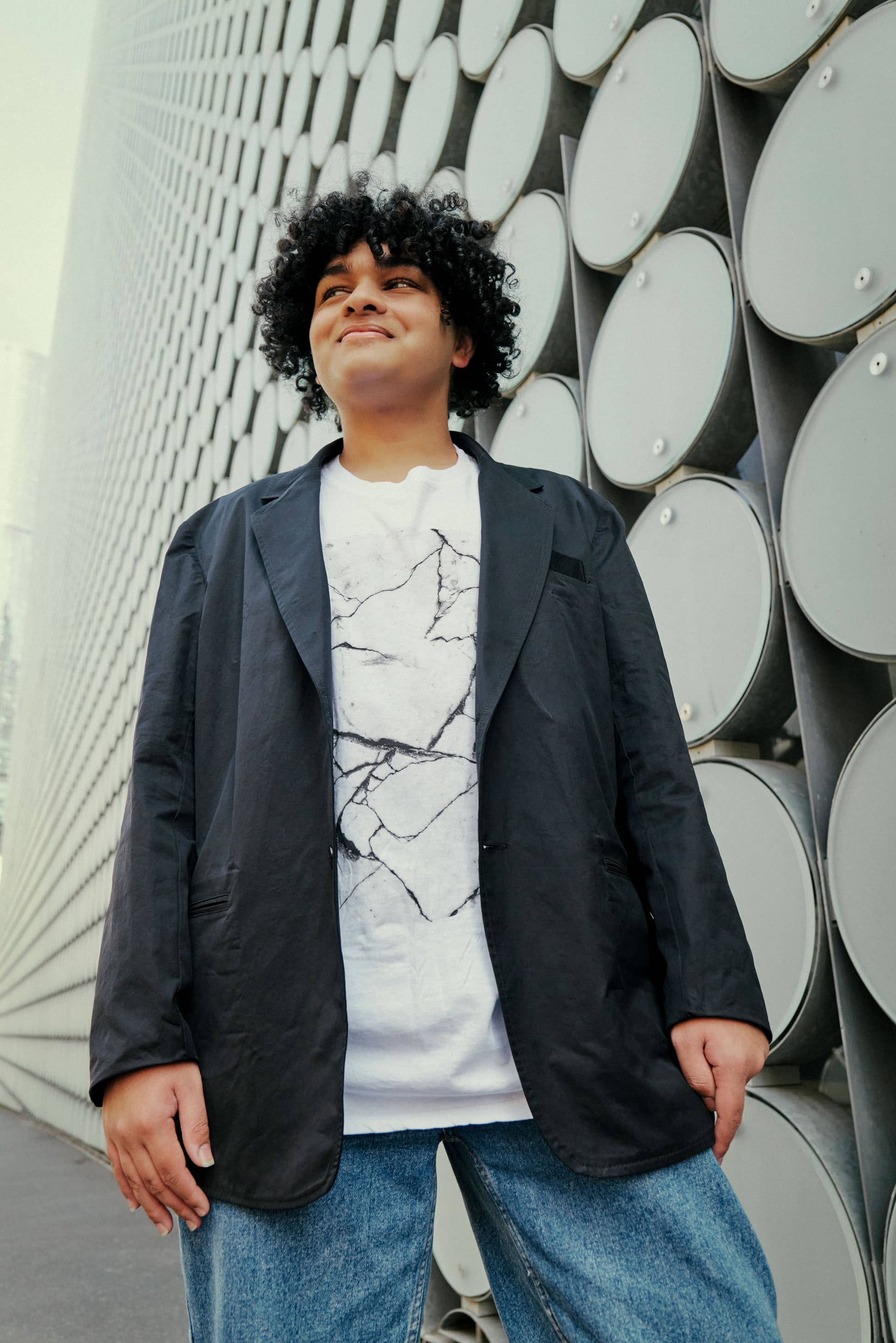-
-
-
-
-
Currency
culture
Meet The Aussie Teenager Showing Australia's Biggest Polluter How Clean Energy Can Make You (Very) Rich


One of the great questions that stalks all would-be activists is the deceptively complex “what can I actually do?”

One of the great questions that stalks all would-be activists is the deceptively complex “what can I actually do?”
In the face of national energy policy, mammoth fossil-fuel corporations, and their boards of powerful directors, our individual roles can feel dwarfed. But occasionally someone reminds us that with creative thinking, an inspiring message and an understanding of power, a single voice can not only break through, it can change the conversation.
18-year-old Melbourne University student and climate activist Ashjayeen Sharif is one of those voices. Last month, Sharif announced that, despite barely being able to vote, he was going to take on AGL: the country’s largest electricity generator and a company Greenpeace infamously labeled “Australia’s biggest polluter”.
He won’t be following the familiar activist pathways of street protests, boycotts and social media posts. Sharif wants to join the board of directors and take on AGL from the inside.
Sharif isn’t just out to point fingers at AGL’s mess. He’s come armed with a sharp vision for the future and a simple pitch: transform the company into a “renewable energy powerhouse” by shutting down Australian coal stations and replacing them with renewable energy to ensure AGL is 100 per cent renewable by 2030.
“Burning coal is something from the past. We don’t need to do it anymore. Renewables are safer, cleaner, cheaper, and they’re so plentiful. Australia is one of the sunniest and windiest countries in the world. We have the technology and resources available for a fully renewable power economy
– Ashjayeen Sharif
”This is hardly wishful thinking. There are precedents where other polluting giants have managed to turn around their business models and have been met with huge environmental, as well as financial, success. Twelve years ago Danish energy company Ørsted (formerly DONG Energy) was a traditional utility that derived 85 per cent of its revenues from fossil fuel. In 2009, it announced a major shift, outlining plans to transition its operations to generate 85 per cent of its power from renewable sources by 2040.

A decade on and it has secured its spot as the world’s largest producer of offshore wind energy and achieved a market cap of USD $67 billion. Closer to home Sun Cable is making a similar bet by developing the world’s largest solar energy infrastructure network. It predicts that its energy projects will “position Australia, Singapore and other Asian markets as world leaders in the intercontinental transmission of renewable electricity. This infrastructure will facilitate the electrification of new and existing industries, supporting large-scale economic development, whilst reducing greenhouse gas emissions.”
These are examples AGL would be wise to pay attention to as its commitment to coal – and ongoing investment in ageing and expensive coal-fired power stations over renewables – proves to be bad business, as well as bad climate policy. Since 2017 AGL’s value has crashed by 70 per cent. In August the company announced a $2.06 billion loss, largely due to what Business Insider described as a “low-margin energy market that has been rocked by the rapid rise of renewables.”
Its Bayswater Power Station in Muswellbrook, New South Wales, (a firm focus of Sharif’s campaign) has already been flagged as increasingly unviable after its biggest customer (Australia’s largest aluminium smelter, Tomago Aluminium) announced plans to switch to renewable energy by 2029.
In comparison, when plans were announced for Australia’s largest renewable energy zone in New South Wales, the project was quickly flooded with enquiries from investors. The government reported that registrations to back the development have flowed at four times the available capacity.
Not surprisingly, AGL hasn’t been enthusiastic about a charismatic teenager vying for a place on its board. “In their notice of appointment this year, they did write a whole section about me and how I was nominated. They had to provide a very clear, bold sentence saying, ‘Please do not support this person’s nomination,’” Sharif recalls.
“They said they don’t believe that my skills and experience would add to the effectiveness of the board
”While he might not be a classic candidate, Sharif’s ideas actually demonstrate his ability to fulfil a director’s number one job: watching out for shareholders’ wallets. As mentioned, AGL is already facing the financial fallout of the fossil fuel industry. But it’s hardly an outlier. Across the globe coal, gas and oil are proving to be bad investments.
In 2020 Forbes reported that in the US, UK and Europe renewable energy investments hugely outperformed fossil fuels. Quoting a study from the Imperial College London and the International Energy Agency, Forbes wrote: “investments in Germany and France yielded returns of 178.2% over a five year period, compared with −20.7% for fossil fuel investments. In the U.K., also over five years, investments in green energy generated returns of 75.4% compared to just 8.8% for fossil fuels. In the U.S., renewables yielded 200.3% returns versus 97.2% for fossil fuels.”

With that context, Sharif’s attempt to sway shareholders’ opinions, secure their trust and protect their investment might not be as far-fetched as AGL would like to present it. As established: it’s the board’s responsibility to safeguard shareholder money. Right now, energy companies that are resistant to transitioning to renewables aren’t doing that.
Listening to Sharif talk about his plans, it becomes clear that his work exists within a long history of corporate shareholder activists (sometimes called activist hedge fund managers) who obtained shares in companies as a way to access annual meetings, vote on company decisions, force engagement on certain topics and create change.

“Corporate activism and shareholder activism is something that’s become more prevalent over recent years,” Sharif says. “We’ve seen shareholder activists in corporations like BHP call for them to get out of coal or oil and gas projects, and they have seen some success. There is precedent for shareholder and corporate activism to take place, especially within an Australian context. That’s definitely one of my inspirations and [it does] influence why I’m running the campaign. It instills confidence in me that this sort of thing can achieve change.”
That confidence is earned. Management consulting company McKinsey & Co reported that globally “activist investors” appear to be “controlling more than $180 billion in embedded capital”. Through this strategy, it’s predicted they could mobilise trillions of dollars to challenge the inner workings and performance of publicly traded companies.
The vote which will ultimately determine Sharif’s fate with AGL will take place at its annual general meeting on 22 September. In the lead up, he’s asking everyone who shares his (very convincing) vision for a safer, more financially secure future to sign his petition of support. Supporters are also able to buy their own AGL shares and directly back his nomination as shareholders. No matter how the vote goes, listening to Sharif’s broader goals, the campaign already feels like a success.
“I want other young people to feel inspired by my campaign to know that [they] can do something similar [and] create a unique creative movement or campaign that will achieve real change
”“I want them to feel inspired to take action themselves…[and] feel empowered to take on everyone that is standing in the way of a safe climate future.”
Feeling inspired to take action? Listen to Ashjayeen Sharif's 'Music to Fight Big Corp to' playlist below.

ABOUT US
CUSTOMER CARE
EDITORIAL & RIISE PRODUCTIONS
© 2021 RIISE, All Rights Reservedjoin riise's mailing list for 10% off your first order.Availability








